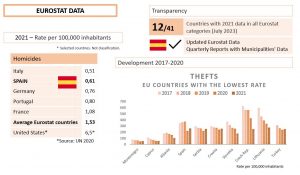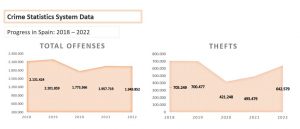Crime Data: Security and Transparency of Tourist Destinations in Spain

Crime Data: Security and Transparency of Tourist Destinations in Spain
- Spain is a safe country, as can be seen from the data collected by law enforcement agencies and compared with Eurostat figures.
- You can consult Dataestur's "Citizen Safety" scorecard with data from the Crime Statistics System and Eurostat.
Spain outperforms most countries in many categories of European safety statistics. For example, it has one of the lowest rates of theft, which is relevant to the tourist environment. This is without taking into account the temporary increases in population that tourism brings to many areas in Spain, which would reduce the crime rate per inhabitant if taken into account. Spain also has one of the lowest homicide rates in the world. This is the statistic most frequently used in international rankings.
Crime statistics, however, discourage comparison between countries because the modelling and treatment of the data tends to be inconsistent. Even in more uniform cases such as Eurostat, there are often problems regarding when crime is measured (whether at the time of reporting, identification of suspects or at some other point in time) or innate problems in the diversity of legal and criminal justice systems. The meta-information in Eurostat data captures many of these discrepancies which leads to international comparisons often being limited to the homicide rate.

For this reason, there is much greater value in analysing a country's performance over time and its transparency in terms of safety and security. In this sense, Spain has shown a decrease in recent years in some crime categories such as theft, violent robbery and in the total number of criminal offences. Moreover, Spain is among the small group of countries with current data in all categories of crime statistics in Eurostat and the Ministry of Interior's Crime Statistics System publishes quarterly reports with updated information on all municipalities with more than 20,000 inhabitants. This transparency highlights the numerous efforts of law enforcement and security forces to ensure a safe environment for citizens and tourists.

Actions for safety in tourist destinations
Safety is one of the key values of the Spanish brand as a tourist destination, and law enforcement and security forces are actively at work with plans focused on the safety of citizens and with efforts aimed directly at tourist services. The objective is to guarantee a safe and trusting environment for everyone – and the data corroborate the positive effect of these measures.
The Safe Tourism Plan is put into practice every year. It includes the publication of advisory guides in different languages on the use of transport, accommodation and recommendations to be followed in public spaces. It also includes active Foreign Tourist Assistance Service (SATE) offices in the main tourist destinations. Its objective is to assist victims in their own language and support tourists in dealing with problems such as card cancellations, contacting embassies and locating family members. This service assisted nearly 10,000 people in 2021. The National Police also have a multilingual telephone reporting service, and the Alertcops mobile app provides assistance in English, French, German, Italian and Russian, as well as in Spanish. The app is available in more than 100 languages via automated translations.
These measures aimed at tourists are complemented by a continuous programme of meetings and training in the field of safety for tourism professionals, holding informative meetings with groups of tourists and Erasmus students, as well as reinforcing the number of police officers in tourism areas during the summer months.
The proactive efforts of the law enforcement and security forces to achieve a safe and secure environment go beyond tourism. There are several safety and security plans in force aimed at specific problems. The Action Plan to Combat Hate Crimes fights discrimination and defends the diversity and integration of different nationalities, races and beliefs in Spain. The Master Plan focuses on improving coexistence and safety in schools and educational environments through direct outreach, training and awareness-raising in schools. The Senior Safety Plan assists the elderly and the professionals and volunteers who work with them. Detailed monitoring is also carried out and topical reports are published on cybercrime, gender-based violence, crimes against sexual freedom and sexual integrity, and missing persons.

